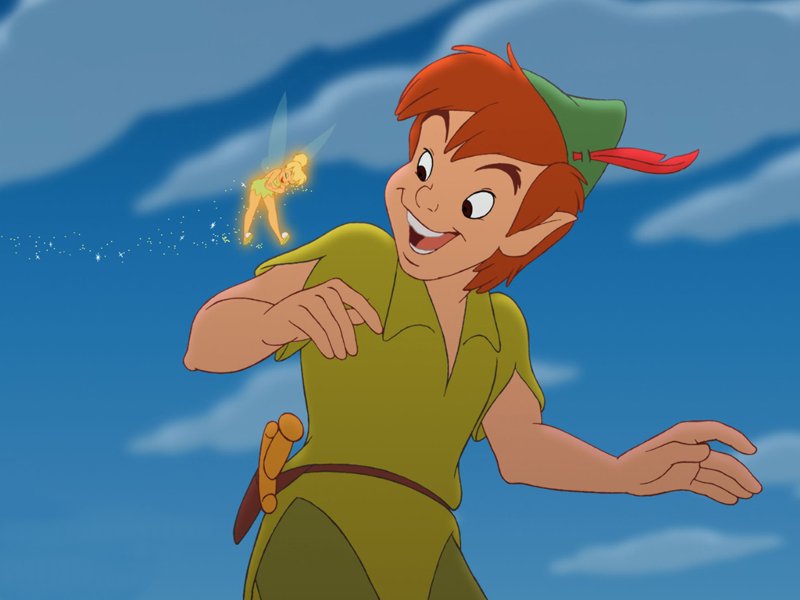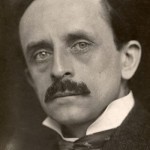
“I am Peter Pan,” Michael Jackson reportedly once said, and of course he chose to name his ranch Neverland. In this second of my two posts marking Jackson’s death, I thought I would reflect upon why J. M. Barrie’s fictional creation meant so much to him.
Peter Pan: The Boy Who Wouldn’t Grow Up appeared first as a play in 1904 and then as the novel Peter and Wendy in 1911. The play and book were instantly popular and have remained so, in large part because they plug deeply into a fundamental human question: how can we hold on to the innocence of childhood as we grow up. Innocence appears as a pearl beyond price, invoking a sense of soul. The world seen through the eyes of children seems fresh and new, not yet having faded “into the light of common day” (to quote Wordsworth’s “Imitations of Immortality”). Given all this, what compensations could adulthood possibly provide?
Even in the best of instances, the world is tough on innocence. For someone like Michael, who reportedly suffered psychological and physical abuse at the hands of his father (not to mention pressure from the music industry), the idea of hiding out in childhood fantasies became irresistible. Here was a private, interior world that seemed beyond the reach of all who sought to use him for their ends. I don’t know enough about Jackson’s art to know if it can be read as a reshaping of his childhood fantasies, but I wouldn’t be surprised if that is the case. His own art could well have served as compensation for his unsatisfactory childhood, just as the vulnerable oyster copes with the invasion of rough sand by creating a pearl.
 “All children, except one, grow up,” Barrie writes in the beginning line of Peter and Wendy. One can imagine young Michael encountering the story and wanting to make it at least two. In Peter Pan, Barrie says that he is mapping childhood fantasies into a story. Not only does he draw us into dreams of flying and fighting pirates (not to mention having a dog for a nanny), but he invites us to publicly declare our belief that the dreams are true. Without our declaration, Tinkerbelle will die.
“All children, except one, grow up,” Barrie writes in the beginning line of Peter and Wendy. One can imagine young Michael encountering the story and wanting to make it at least two. In Peter Pan, Barrie says that he is mapping childhood fantasies into a story. Not only does he draw us into dreams of flying and fighting pirates (not to mention having a dog for a nanny), but he invites us to publicly declare our belief that the dreams are true. Without our declaration, Tinkerbelle will die.
So far, all well and good. The problems begin when, for whatever reasons, we refuse to grow up and engage maturely with the world. A sense of innocence under siege drives any number of social movements and pushes some to extremes, whether over the issue of unborn fetuses, racial purity and “white womanhood,” the pristine wilderness, or whatever. Pedophiles and certain sexual deviants are obsessed with innocence. Nabokov’s Lolita is the depiction of a man who finds an Alice-in-Wonderland, Anabelle-Lee type purity in young “nymphets,” denying the heroine her subjectivity in the process. Humbert Humbert’s two idols, Lewis Carroll and Edgar Allen Poe, are authors who had some problems when it came to dealing with real children: Carroll inappropriately photographed nude little girls and Poe married his 13-year-old cousin.
The problem does not lie in dreams of innocence and purity. I suspect most adults have versions of these dreams. The problem lies in people attemption to impose their fantasies on real life.
Like many children’s classics, Peter Pan signals that we must grow up. John, Michael, and the Lost Boys will lose their ability to fly. Wendy, to the horror of Peter, will grow up, get married, and have children of her own. Christopher Robin will leave the Three Acre Wood and go to school. Alice will become like her sister and learn to read books without “pictures or conversations.” Mary will emerge from the secret garden, and the garden will become just another garden.
Fortunately, we don’t have to entirely lose touch with our inner Peter. We can reclaim him every time we reread Peter Pan and when we read Peter Pan to our children and grandchildren. But we must keep him in perspective. It appears as though Michael had difficulty maintaining this perspective.


One Trackback
[…] of The House at Pooh Corner, which hints at a time when Christopher Robin and Pooh will separate, just as we avoided the final chapter of Peter Pan, when Wendy grows up. I didn’t object. In fact, I grasped that I was supposed to […]